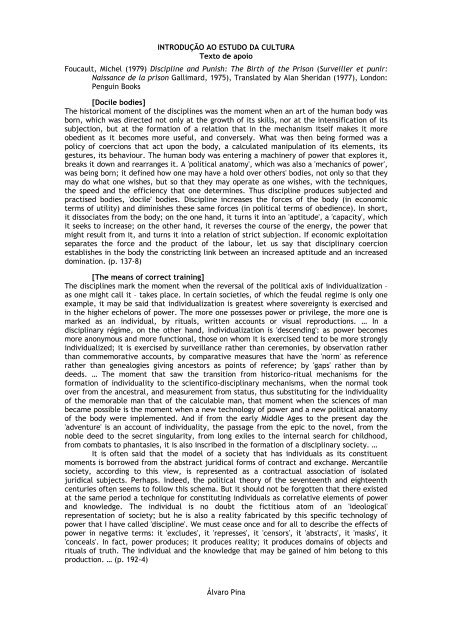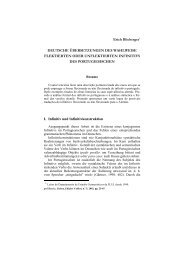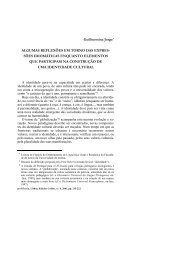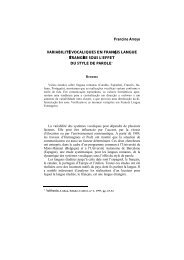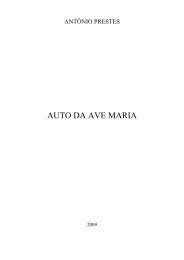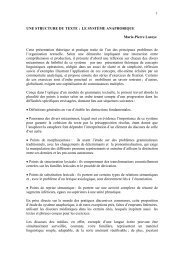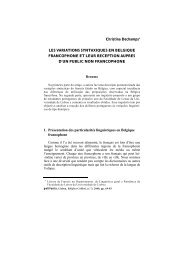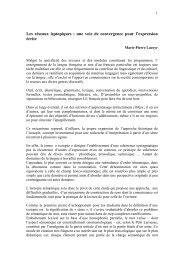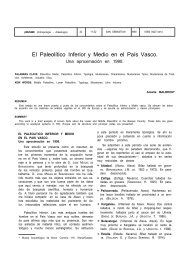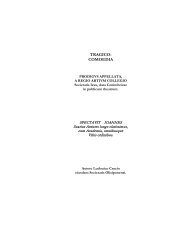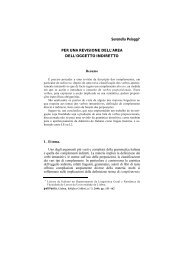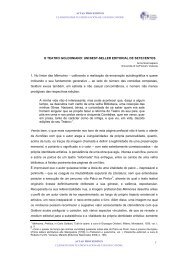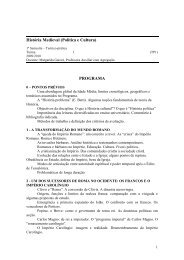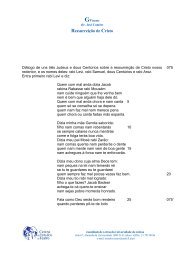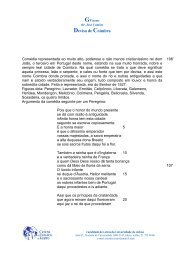Foucault, Michel (1979) Discipline and Punish: The Birth of the ...
Foucault, Michel (1979) Discipline and Punish: The Birth of the ...
Foucault, Michel (1979) Discipline and Punish: The Birth of the ...
Create successful ePaper yourself
Turn your PDF publications into a flip-book with our unique Google optimized e-Paper software.
INTRODUÇÃO AO ESTUDO DA CULTURA<br />
Texto de apoio<br />
<strong>Foucault</strong>, <strong>Michel</strong> (<strong>1979</strong>) <strong>Discipline</strong> <strong>and</strong> <strong>Punish</strong>: <strong>The</strong> <strong>Birth</strong> <strong>of</strong> <strong>the</strong> Prison (Surveiller et punir:<br />
Naissance de la prison Gallimard, 1975), Translated by Alan Sheridan (1977), London:<br />
Penguin Books<br />
[Docile bodies]<br />
<strong>The</strong> historical moment <strong>of</strong> <strong>the</strong> disciplines was <strong>the</strong> moment when an art <strong>of</strong> <strong>the</strong> human body was<br />
born, which was directed not only at <strong>the</strong> growth <strong>of</strong> its skills, nor at <strong>the</strong> intensification <strong>of</strong> its<br />
subjection, but at <strong>the</strong> formation <strong>of</strong> a relation that in <strong>the</strong> mechanism itself makes it more<br />
obedient as it becomes more useful, <strong>and</strong> conversely. What was <strong>the</strong>n being formed was a<br />
policy <strong>of</strong> coercions that act upon <strong>the</strong> body, a calculated manipulation <strong>of</strong> its elements, its<br />
gestures, its behaviour. <strong>The</strong> human body was entering a machinery <strong>of</strong> power that explores it,<br />
breaks it down <strong>and</strong> rearranges it. A 'political anatomy', which was also a 'mechanics <strong>of</strong> power',<br />
was being born; it defined how one may have a hold over o<strong>the</strong>rs' bodies, not only so that <strong>the</strong>y<br />
may do what one wishes, but so that <strong>the</strong>y may operate as one wishes, with <strong>the</strong> techniques,<br />
<strong>the</strong> speed <strong>and</strong> <strong>the</strong> efficiency that one determines. Thus discipline produces subjected <strong>and</strong><br />
practised bodies, 'docile' bodies. <strong>Discipline</strong> increases <strong>the</strong> forces <strong>of</strong> <strong>the</strong> body (in economic<br />
terms <strong>of</strong> utility) <strong>and</strong> diminishes <strong>the</strong>se same forces (in political terms <strong>of</strong> obedience). In short,<br />
it dissociates from <strong>the</strong> body; on <strong>the</strong> one h<strong>and</strong>, it turns it into an 'aptitude', a 'capacity', which<br />
it seeks to increase; on <strong>the</strong> o<strong>the</strong>r h<strong>and</strong>, it reverses <strong>the</strong> course <strong>of</strong> <strong>the</strong> energy, <strong>the</strong> power that<br />
might result from it, <strong>and</strong> turns it into a relation <strong>of</strong> strict subjection. If economic exploitation<br />
separates <strong>the</strong> force <strong>and</strong> <strong>the</strong> product <strong>of</strong> <strong>the</strong> labour, let us say that disciplinary coercion<br />
establishes in <strong>the</strong> body <strong>the</strong> constricting link between an increased aptitude <strong>and</strong> an increased<br />
domination. (p. 137-8)<br />
[<strong>The</strong> means <strong>of</strong> correct training]<br />
<strong>The</strong> disciplines mark <strong>the</strong> moment when <strong>the</strong> reversal <strong>of</strong> <strong>the</strong> political axis <strong>of</strong> individualization –<br />
as one might call it – takes place. In certain societies, <strong>of</strong> which <strong>the</strong> feudal regime is only one<br />
example, it may be said that individualization is greatest where sovereignty is exercised <strong>and</strong><br />
in <strong>the</strong> higher echelons <strong>of</strong> power. <strong>The</strong> more one possesses power or privilege, <strong>the</strong> more one is<br />
marked as an individual, by rituals, written accounts or visual reproductions. … In a<br />
disciplinary régime, on <strong>the</strong> o<strong>the</strong>r h<strong>and</strong>, individualization is 'descending': as power becomes<br />
more anonymous <strong>and</strong> more functional, those on whom it is exercised tend to be more strongly<br />
individualized; it is exercised by surveillance ra<strong>the</strong>r than ceremonies, by observation ra<strong>the</strong>r<br />
than commemorative accounts, by comparative measures that have <strong>the</strong> 'norm' as reference<br />
ra<strong>the</strong>r than genealogies giving ancestors as points <strong>of</strong> reference; by 'gaps' ra<strong>the</strong>r than by<br />
deeds. … <strong>The</strong> moment that saw <strong>the</strong> transition from historico-ritual mechanisms for <strong>the</strong><br />
formation <strong>of</strong> individuality to <strong>the</strong> scientifico-disciplinary mechanisms, when <strong>the</strong> normal took<br />
over from <strong>the</strong> ancestral, <strong>and</strong> measurement from status, thus substituting for <strong>the</strong> individuality<br />
<strong>of</strong> <strong>the</strong> memorable man that <strong>of</strong> <strong>the</strong> calculable man, that moment when <strong>the</strong> sciences <strong>of</strong> man<br />
became possible is <strong>the</strong> moment when a new technology <strong>of</strong> power <strong>and</strong> a new political anatomy<br />
<strong>of</strong> <strong>the</strong> body were implemented. And if from <strong>the</strong> early Middle Ages to <strong>the</strong> present day <strong>the</strong><br />
'adventure' is an account <strong>of</strong> individuality, <strong>the</strong> passage from <strong>the</strong> epic to <strong>the</strong> novel, from <strong>the</strong><br />
noble deed to <strong>the</strong> secret singularity, from long exiles to <strong>the</strong> internal search for childhood,<br />
from combats to phantasies, it is also inscribed in <strong>the</strong> formation <strong>of</strong> a disciplinary society. …<br />
It is <strong>of</strong>ten said that <strong>the</strong> model <strong>of</strong> a society that has individuals as its constituent<br />
moments is borrowed from <strong>the</strong> abstract juridical forms <strong>of</strong> contract <strong>and</strong> exchange. Mercantile<br />
society, according to this view, is represented as a contractual association <strong>of</strong> isolated<br />
juridical subjects. Perhaps. Indeed, <strong>the</strong> political <strong>the</strong>ory <strong>of</strong> <strong>the</strong> seventeenth <strong>and</strong> eighteenth<br />
centuries <strong>of</strong>ten seems to follow this schema. But it should not be forgotten that <strong>the</strong>re existed<br />
at <strong>the</strong> same period a technique for constituting individuals as correlative elements <strong>of</strong> power<br />
<strong>and</strong> knowledge. <strong>The</strong> individual is no doubt <strong>the</strong> fictitious atom <strong>of</strong> an 'ideological'<br />
representation <strong>of</strong> society; but he is also a reality fabricated by this specific technology <strong>of</strong><br />
power that I have called 'discipline'. We must cease once <strong>and</strong> for all to describe <strong>the</strong> effects <strong>of</strong><br />
power in negative terms: it 'excludes', it 'represses', it 'censors', it 'abstracts', it 'masks', it<br />
'conceals'. In fact, power produces; it produces reality; it produces domains <strong>of</strong> objects <strong>and</strong><br />
rituals <strong>of</strong> truth. <strong>The</strong> individual <strong>and</strong> <strong>the</strong> knowledge that may be gained <strong>of</strong> him belong to this<br />
production. … (p. 192-4)<br />
Álvaro Pina
INTRODUÇÃO AO ESTUDO DA CULTURA<br />
Texto de apoio<br />
[Panopticism]<br />
<strong>The</strong> public execution was <strong>the</strong> logical culmination <strong>of</strong> a procedure governed by <strong>the</strong> Inquisition.<br />
<strong>The</strong> practice <strong>of</strong> placing individuals under 'observation' is a natural extension <strong>of</strong> justice imbued<br />
with disciplinary methods <strong>and</strong> examination procedures. Is it surprising that <strong>the</strong> cellular prison,<br />
with its regular chronologies, forced labour, its authorities <strong>of</strong> surveillance <strong>and</strong> registration, its<br />
experts in normality, who continue <strong>and</strong> multiply <strong>the</strong> functions <strong>of</strong> <strong>the</strong> judge, should have<br />
become <strong>the</strong> modern instrument <strong>of</strong> penality? Is it surprising that prisons resemble factories,<br />
schools, barracks, hospitals, which all resemble prisons? (p. 227-8)<br />
Álvaro Pina


